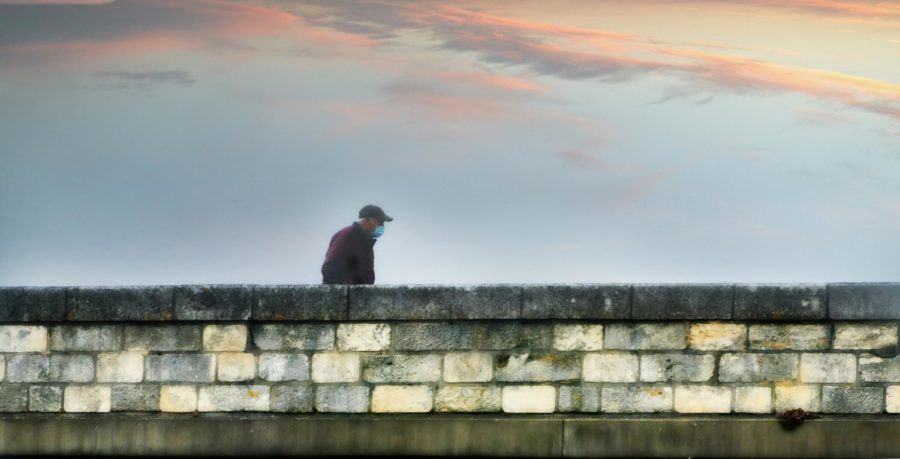Vieira: What now?
October 6, 2020
The world has been busy in this “dance” with quarantines and lockdowns for more than six months now; however, a return to normality might be closer than we imagine. But all this begs the question: will things be different? Will it ever go back to what it was?
Because of this unique situation we all found ourselves in, we inevitably developed a set of brand new habits. Items like masks and pocket-size hand sanitizers are essentials we’ve now become extremely familiar with. It’s not “phone, wallet, keys” anymore, but rather “phone, wallet, keys, mask.”
We are now wary of our surroundings as well as peers. Remember when we all used to blow out candles on a birthday cake without thinking anything of it? Good times.
At least there are a few positive aspects to this post-quarantine world, starting with personal hygiene. If there is anything we take out of this whole pandemic, it’s that we need to wash our hands and keep our surroundings clean. People are now more aware of their own health. I think that’s a win. It is exactly this collective awareness that leads me into the next topic: the reshaping of the public health system. The idea of universal health care is starting to become more popular in all countries. Maybe in the next few years, we will start to see some progress within this sector.
Before we look at the future, we must reflect on the past. A crisis tends to reinforce preexisting trends, and a pandemic makes all these problems even harder to solve. When the economy finds itself going through big disruptions such as now, it is only natural that politics start to dismay.
In the past few years, the post-World War II order has been deteriorating at an alarming rate, and some significant rivalries are starting to emerge. With China being the rising power, it is inevitable that the body politic of this country starts to compare the two systems and wonder whether the economy will ever recover. Researchers at FiveThirtyEight, a think-tank, inferred that it might be hard to get where we were by the beginning of 2021.
Businesses are intolerant of inefficiencies like delays in production because of new guidelines being imposed and will pass on any uncertainties, such as a not-granted profit, avoiding committing to big-picture investments. While globalization undergoes an incredible slowdown and global supply chains are experiencing major interruptions, the role of the state is now more critical than ever.
The department becomes more powerful after periods of crises. Edward Carr, deputy editor of The Economist, reckons a recession opens the door for government intervention in order to allow an economy to go forward, consequentially raising the standards of what people expect the state to do during an emergency, which — like it or not — might make the country’s directorate even stronger.
Geared toward economic recovery, we must consider how business will be conducted. What is going to happen to the American workplace? It will be more distant. In this day and age, it could be said that technology is saving businesses, enabling employees to work remotely from home and inducing face-to-face meetings to be reserved for the most important occasions. Callum Williams, senior economics writer at The Economist, stresses the importance of personal interactions, sayiinig this trend might “reduce the exchange of ideas.”
Despite these industries being greatly impacted, I believe what suffered the most devastating consequences of this pandemic were the traveling and tourism sectors, with losses up to $910 billion. Nearly all important research and papers involve a large group of people, most of the time from several different places around the world; business travel is out of the picture unless, like I said before, we are talking about extremely important events to attend. Perhaps this will stimulate innovation.
Global tourism, on the other hand, will be affected quite a lot, leaving regions of the world like Europe in big economic trouble since it greatly relies on tourism for state revenue. Another interesting aspect of traveling is that it will become more selective and open to fewer people. Aircraft capacities are reduced, cleaning in between flights is more thorough and there are fewer departing flights overall. This can only mean one thing: increased pricing. Higher prices will drive traveling to become a privilege enjoyed only by those who are lucky enough to have money to spare for this activity.
Lastly, I have found myself pondering on for how long these cleaning protocols and social distancing guidelines will be enforced. And if not, will people still try to adhere to these safety guidelines for their own sakes?
What about public gatherings like concerts and festivals — which have been rescheduled to as soon as June, according to Songkick, a popular website used to track event dates? Are people going to be wearing masks? Obviously, social distancing will be extremely hard to maintain, but is anyone even going to be concerned?

















